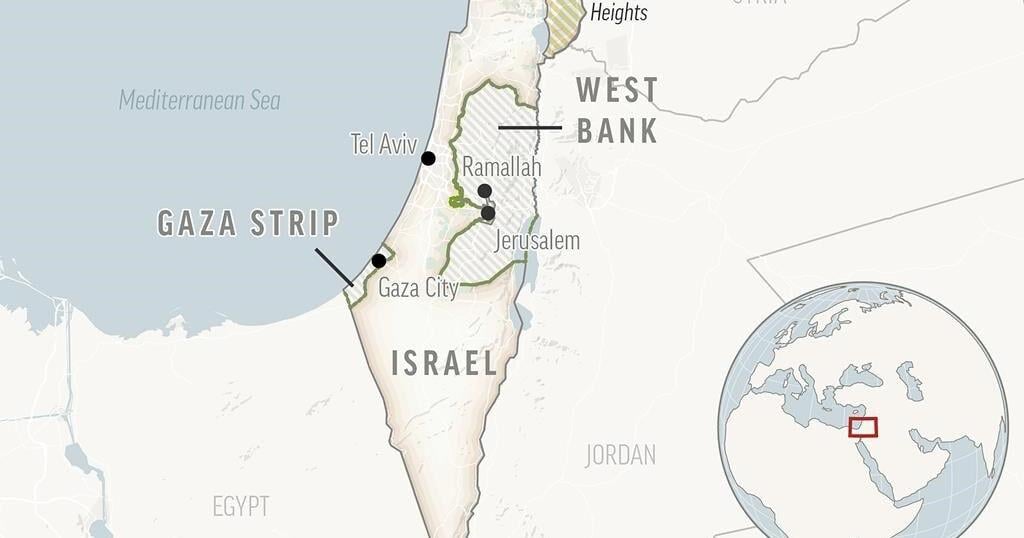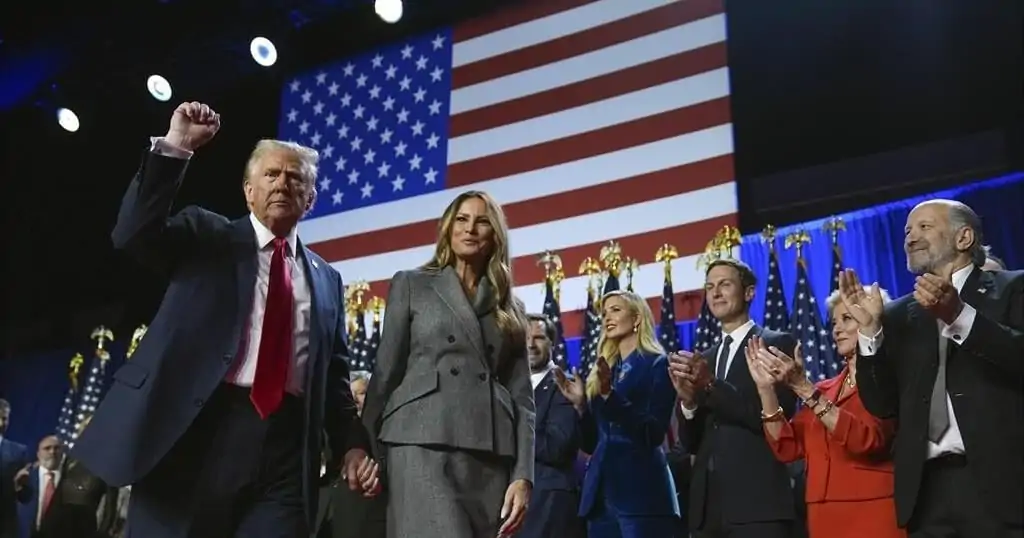NAHARIYA, Israel (AP) — Hezbollah fired over 100 rockets early Sunday across northern Israel, with some landing near the city of Haifa, as Israel launched hundreds of strikes on Lebanon. A Hezbollah leader declared an “open-ended battle” was underway as both sides appeared to be spiraling closer toward all-out war.
The overnight rocket barrage was in response to Israeli attacks in Lebanon that have killed dozens, including a veteran Hezbollah commander, and an unprecedented attack targeting the group’s communications devices. Air raid sirens across northern Israel sent hundreds of thousands of people scrambling into shelters.
One struck near a residential building in Kiryat Bialik, a city near Haifa, wounding at least three people and setting buildings and cars ablaze. Israel’s Magen David Adom rescue service said four people were wounded.
Avi Vazana raced to a shelter with his wife and 9-month-old baby before he heard the rocket hitting. Then he went back outside to see if anyone was hurt.
“I ran without shoes, without a shirt, only with pants. I ran to this house when everything was still on fire to try to find if there are other people,” he said.
Lebanon’s Health Ministry said three people were killed and four wounded in Israeli strikes near the border, without saying whether they were civilians or combatants.
Hezbollah responds to unprecedented blows
The rocket attacks followed an Israeli airstrike Friday in Beirut killed at least 45 people, including Akil, one of Hezbollah’s top leaders, several other fighters, and women and children.
Hezbollah was already reeling from a sophisticated attack that caused thousands of pagers and walkie-talkies to explode just days earlier. But it faces a difficult balance of stretching the rules of engagement by hitting deeper into Israel, while at the same time trying to avoid large-scale attacks on civilian areas and infrastructure that could trigger a full-scale war that it would rather not start and take the blame for.
Hezbollah’s deputy leader Naim Kassem said Sunday’s rocket attack was just the beginning of what’s now an ″open-ended battle” with Israel.
“We admit that we are pained. We are humans. But as we are pained — you will also be pained,” Kassem said at the funeral of top Hezbollah commander Ibrahim Akil. He vowed Hezbollah will continue military operations against Israel in support of Gaza but also warned of unexpected attacks “from outside the box,” pointing to rockets fired deeper into Israel.
Prime Minister Benjamin Netanyahu said Israel would take whatever action was necessary to restore security in the north and allow people to return to their homes.
“No country can accept the wanton rocketing of its cities. We can’t accept it either,” he said.
White House national security spokesman John Kirby remained hopeful for a peaceful resolution, telling “Fox News Sunday” the U.S. has been “involved in extensive and quite assertive diplomacy.”
“We are watching all these escalating tensions that have been occurring over the last week or so, with great concern, and we want to make sure that we can continue to do everything we can to try to prevent this from becoming an all-out war there with Hezbollah across that Lebanese border,” he said.
Israel says it thwarted an even larger attack from Hezbollah
The Israeli military said it struck about 400 militant sites, including rocket launchers, across southern Lebanon in the past 24 hours, thwarting an even larger attack.
“Hundreds of thousands of civilians have come under fire across a lot of northern Israel,” said Israeli military spokesman Lt. Col. Nadav Shoshani. “Today we saw fire that was deeper into Israel than before.”
The military also said it intercepted multiple aerial devices fired from the direction of Iraq, after Iran-backed militant groups there claimed to have launched a drone attack on Israel.
School was canceled across northern Israel, and the Health Ministry said all hospitals in the north would begin moving operations to protected areas within the medical centers.
Separately, Israeli forces raided the West Bank bureau of Al-Jazeera, which it had banned earlier this year, accusing it of serving as a mouthpiece for militant groups, allegations denied by the pan-Arab broadcaster.
U.N. envoy says the region is on the brink of catastrophe
Israel and Hezbollah have traded fire since the outbreak of the war in Gaza nearly a year ago, when the militant group began firing rockets in solidarity with the Palestinians and its fellow Iran-backed ally Hamas. The low-level fighting has killed dozens of people in Israel, hundreds in Lebanon, and displaced tens of thousands on both sides of the frontier.
Until recently, neither side was believed to be seeking an all-out war, and Hezbollah has so far stopped short of targeting Tel Aviv or major civilian infrastructure. But in recent weeks, Israel has shifted its focus from Gaza to Lebanon. Hezbollah has said it would only halt its attacks if the war in Gaza ends, as a cease-fire there appears increasingly elusive.
The war in Gaza began with Hamas’ Oct. 7 attack into Israel, in which Palestinian militants killed about 1,200 people and took about 250 others hostage. They are still holding about 100 captives, a third of whom are believed to be dead. Over 41,000 Palestinians have been killed, according to Gaza’s Health Ministry. It doesn’t say how many were fighters, but says women and children make up more than half of the dead.
“With the region on the brink of an imminent catastrophe, it cannot be overstated enough: there is NO military solution that will make either side safer,” Jeanine Hennis-Plasschaert, the U.N. envoy for Lebanon, said in an X post.
Families of Israeli hostages and residents of Gaza expressed fears the fighting in Lebanon will direct international attention from their own plights.
“I’m incredibly concerned with the increased tensions with Hezbollah because, my biggest concern is that, all the public’s attention and the world’s attention” would be distracted, said Udi Goren, a relative of Tal Haimi, an Israeli man who was killed Oct. 7 and whose body was taken into Gaza.
Enas Kollab, a Palestinian displaced from Gaza, voiced similar fears. “We are afraid that the situation in Lebanon will affect us — that all attention will turn to Lebanon and we will become forgotten,” she said.
Hezbollah says it’s using new weapons
Hezbollah said it had launched dozens of Fadi 1 and Fadi 2 missiles — a new weapon the group hadn’t used before — at the Ramat David airbase, southeast of Haifa, “in response to the repeated Israeli attacks that targeted various Lebanese regions and led to the fall of many civilian martyrs.”
In July, the group released what it said was video it had taken of the base with surveillance drones.
Hezbollah also said it had targeted the facilities of the Rafael defense firm, headquartered in Haifa, calling it retaliation for the wireless devices attack. It didn’t provide evidence, and the Israeli military declined to comment on the statement.
Hezbollah has vowed to retaliate for a wave of explosions that hit pagers and walkie-talkies belonging to Hezbollah members on Tuesday and Wednesday, killing at least 37 people — including two children — and wounding about 3,000. The attacks were widely blamed on Israel, which hasn’t confirmed or denied responsibility.
An Israeli airstrike Friday took down an eight-story building in a densely populated neighborhood in Beirut’s southern suburbs as Hezbollah members met in the basement, according to Israel. Among those killed was Akil., who commanded the group’s special forces unit.
___
Kareem Chehayeb reported from Beirut. Moshe Edri in Kiryat Bialik; Wafaa Shurafa in Deir al-Balah, Gaza Strip; and Shlomo Mor in Tel Aviv, Israel, contributed.
___

























